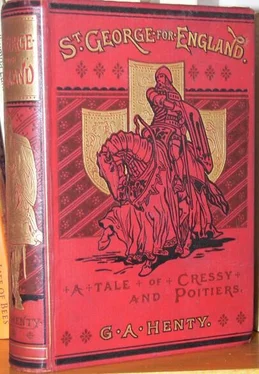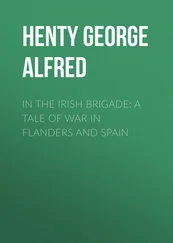G. Henty - St. George for England - A Tale of Cressy and Poitiers
Здесь есть возможность читать онлайн «G. Henty - St. George for England - A Tale of Cressy and Poitiers» весь текст электронной книги совершенно бесплатно (целиком полную версию без сокращений). В некоторых случаях можно слушать аудио, скачать через торрент в формате fb2 и присутствует краткое содержание. Жанр: Старинная литература, на английском языке. Описание произведения, (предисловие) а так же отзывы посетителей доступны на портале библиотеки ЛибКат.
- Название:St. George for England: A Tale of Cressy and Poitiers
- Автор:
- Жанр:
- Год:неизвестен
- ISBN:нет данных
- Рейтинг книги:3 / 5. Голосов: 1
-
Избранное:Добавить в избранное
- Отзывы:
-
Ваша оценка:
- 60
- 1
- 2
- 3
- 4
- 5
St. George for England: A Tale of Cressy and Poitiers: краткое содержание, описание и аннотация
Предлагаем к чтению аннотацию, описание, краткое содержание или предисловие (зависит от того, что написал сам автор книги «St. George for England: A Tale of Cressy and Poitiers»). Если вы не нашли необходимую информацию о книге — напишите в комментариях, мы постараемся отыскать её.
St. George for England: A Tale of Cressy and Poitiers — читать онлайн бесплатно полную книгу (весь текст) целиком
Ниже представлен текст книги, разбитый по страницам. Система сохранения места последней прочитанной страницы, позволяет с удобством читать онлайн бесплатно книгу «St. George for England: A Tale of Cressy and Poitiers», без необходимости каждый раз заново искать на чём Вы остановились. Поставьте закладку, и сможете в любой момент перейти на страницу, на которой закончили чтение.
Интервал:
Закладка:
King Edward now advanced into the forest of Cressy.
Hugh de le Spencer, with a considerable force, was dispatched to Crotoy, which he carried by assault after a severe conflict, in which four thousand of the French men-at-arms were slain. The capture of this city removed all danger of want from the army, for large stores of wine and meal were found there, and Sir Hugh at once sent off a supply to the tired army in the field.
The possession of Crotoy and the mouth of the Somme would have now rendered it easy for the English monarch to have transported his troops to England, and to have returned triumphant after the accomplishment of his extraordinary and most successful march through France. The army, however, was elated by the many great successes it had won, he was now in Ponthieu, which was one of his own fiefs, and he determined to make a stand in spite of the immense superiority of the enemy.
Next morning, then—Friday, the 25th of August, 1346—he dispatched the Earl of Warwick, with Godfrey of Harcourt and Lord Cobham, to examine the ground and choose a site for a battle.
The plan of the fight was drawn out by the king and his councilors, and the king yielded to the Black Prince the chief place of danger and honor, placing with him the Earl of Warwick, Sir John Chandos, and many of his best knights.
The ground which had been chosen for the battle was an irregular slope between the forest of Cressy and the river Maie near the little village of Canchy. The slope looked toward the south and east, from which quarters the enemy was expected to arrive, and some slight defenses were added to the natural advantages of the ground.
On the night of the 25th all the principal leaders of the British host were entertained by King Edward. Next morning mass was celebrated, and the king, the prince, and many knights and nobles received the sacrament, after which the trumpets sounded, and the army marched to take up its position. Its numbers are variously estimated, but the best account puts it at about thirty thousand men, which, considering that thirty-two thousand had crossed the Channel to La Hogue, is probably about the force which would have been present, allowing that two thousand had fallen in the various actions or had died from disease.
The division of the Black Prince consisted of eight hundred men-at-arms, four thousand archers, and six thousand Welsh foot. The archers, as usual, were placed in front, supported by the light troops of Wales and the men-at-arms; on his left was the second division, commanded by the Earls of Arundel and Northampton; its extreme left rested on Canchy and the river, and it was further protected by a deep ditch; this corps was about seven thousand strong.
The king himself took up his position on a knoll of rising ground surmounted by a windmill, and twelve thousand men under his personal command were placed here in reserve.
In the rear of the prince's division an inclosure of stakes was formed; in this, guarded by a small body of archers, were ranged the wagons and baggage of the army, together with all the horses, the king having determined that the knights and men-at-arms on his side should fight on foot.
When the army had taken up its position, the king, mounted on a small palfrey, with a white staff in his hand, rode from rank to rank exhorting his soldiers to do their duty gallantly. It was nearly noon before he had passed through all the lines, and permission was then given to the soldiers to fall out from their ranks and to take refreshments while waiting for the coming of the enemy. This was accordingly done, the men eating and drinking at their ease and lying down in their ranks on the soft grass, with their steel caps and their bows or pikes beside them.
In the mean time the French had, on their side, been preparing for the battle. Philip had crossed the Somme at Abbeville late on Thursday afternoon, and remained there next day, marshaling the large reënforcements which were hourly arriving. His force now considerably exceeded one hundred thousand men, the number with which he had marched from Amiens three days previously.
Friday was the Festival of St. Louis, and that evening Philip gave a splendid banquet to the whole of the nobles of his army.
On the following morning the king, accompanied by his brother the Count D'Alençon, the old King of Bohemia and his son, the King of Rome, the Duke of Lorraine, the Count of Blois, the Count of Flanders, and a great number of other feudal princes, heard mass at the abbey, and then marched with his great army toward Cressy. He moved but slowly in order to give time to all the forces scattered over the neighborhood to come up, and four knights, headed by one of the King of Bohemia's officers, went forward to reconnoiter the English position. They approached within very short distance of the English lines and gained a very exact knowledge of the position, the English taking no measures to interrupt the reconnaissance. They returned with the information they had gathered, and the leader of the party, Le Moyne de Basele, one of the most judicious officers of his time, strongly advised the king to halt his troops, pointing out that as it was evident the English were ready to give battle, and as they were fresh and vigorous, while the French were wearied and hungry, it would be better to encamp and give battle the next morning.
Philip saw the wisdom of the advice and ordered his two marshals, the Lord of St. Venant and Charles de Montmorency, to command a halt. They instantly spurred off, one to the front and the other to the rear, commanding the leaders to halt their banners. Those in advance at once obeyed, but those behind still pressed on, declaring that they would not halt until they were in the front line. All wanted to be first, in order to obtain their share of the honor and glory of defeating the English. Those in front, seeing the others still coming on, again pressed forward, and thus, in spite of the efforts of the king and his marshals, the French nobles with their followers pressed forward in confusion, until, passing through a small wood, they found themselves suddenly in the presence of the English army.
CHAPTER XIV.
CRESSY.
The surprise of the French army at finding themselves in the presence of the English was so great that the first line recoiled in confusion. Those marching up from behind imagined that they had been already engaged and repulsed by the English, and the disorder spread through the whole army, and was increased by the common people, who had crowded to the field in immense numbers from the whole country round to see the battle and share in the plunder of the English camp.
From King Edward's position on the rising ground he could see the confusion which prevailed in the French ranks, and small as were his forces, he would probably have obtained an easy victory by ordering a sudden charge upon them. The English, however, being dismounted, but small results would have followed the scattering of the great host of the French. The English army therefore remained immovable, except that the soldiers rose from the ground, and taking their places in the ranks, awaited the onslaught of the enemy.
King Philip himself now arrived on the field, and his hatred for the English led him at once to disregard the advice which had been given him and to order the battle to commence as soon as possible.
The army was divided into four bodies, of which Philip commanded one, the Count D'Alençon the second, the King of Bohemia the third, and the Count of Savoy the fourth. Besides these were a band of fifteen thousand mercenaries, Genoese cross-bowmen, who were now ordered to pass between the ranks of cavalry and to clear the ground of the English archers, who were drawn up in the usual form in which they fought—namely, in very open order, line behind line, the men standing alternately, so that each had ample room to use his bow and to fire over the heads of those in front. The formation was something that of a harrow, and, indeed, exactly resembled that in which the Roman archers fought, and was called by them a quincunx.
Читать дальшеИнтервал:
Закладка:
Похожие книги на «St. George for England: A Tale of Cressy and Poitiers»
Представляем Вашему вниманию похожие книги на «St. George for England: A Tale of Cressy and Poitiers» списком для выбора. Мы отобрали схожую по названию и смыслу литературу в надежде предоставить читателям больше вариантов отыскать новые, интересные, ещё непрочитанные произведения.
Обсуждение, отзывы о книге «St. George for England: A Tale of Cressy and Poitiers» и просто собственные мнения читателей. Оставьте ваши комментарии, напишите, что Вы думаете о произведении, его смысле или главных героях. Укажите что конкретно понравилось, а что нет, и почему Вы так считаете.












